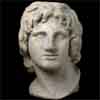Egypt timeline

With the return to favour of the god Amen, the young Tutankhaten's name is changed to Tutankhamun

The young Egyptian pharaoh, Tutankhamun, dies and is buried in a suitable tomb

Ramses II, perhaps the greatest of Egypt's pharaohs, begins a reign of sixty-six years
An indecisve battle between the Hittites and the Egyptians, at Kadesh, stabilizes the frontier between the two empires
Moses is with the Hebrew tribes in Sinai, after the exodus from Egypt

Ramses II creates a spectacular temple in his own honour at Abu Simbel
Mysterious raiders from the sea cause chaos throughout the eastern Mediterranean, from Greece to Palestine and Egypt
Libyans in the Egyptian army take control of the nation and rule as pharaohs
The earliest surviving sundial is in use in Egypt
The king of Cush, or Nubia, conquers down the Nile to the sea, establishing the Cushite dynasty

Egyptian scribes develop an abbreviated version of hieroglyphs for everyday use, in the script known as demotic ('for the people')
The Egyptian city of Memphis falls to an Assyrian army, soon to be followed by Thebes
The Babylonians defeat an Egyptian army at Carchemish, but do not press on into Egypt
Isis, who is able to restore her husband Osiris after he has been chopped into pieces, becomes one of the most popular deities in Egypt
The Persians defeat an Egyptian army at Pelusium and then capture Memphis
The Persian emperor Darius I constructs a canal linking the Nile to the Red Sea
Forces of the Delian League assist the Egyptians in a successful revolt against their Persian rulers
The Greeks suffer a major reverse when their fleet is trapped on the Nile and destroyed by the Persians
The Greek historian Herodotus visits Egypt and provides, among many other details, an account of the process of mummification
Alexander the Great's army arrives in Egypt and the Persian governor of the province rapidly surrenders
In Memphis Alexander sacrifices to Apis, a sacred bull, and is crowned pharaoh by the priests

While in Egypt, Alexander founds Alexandria – the best known of the many towns he establishes to spread Greek culture
Alexander travels far into the desert, to a famous oracle of the sun god Amon (or Amon-Re) at Siwah, where the priest recognizes him as the son of the god
The spread of Greek rule by Alexander introduces the Hellenistic age, which will last for three centuries

In the carve up of Alexander the Great's empire, Ptolemy wins Egypt and founds the Ptolemaic dynasty – with himself as the pharaoh Ptolemy I









